Index
Immersive Information Systems (BA)
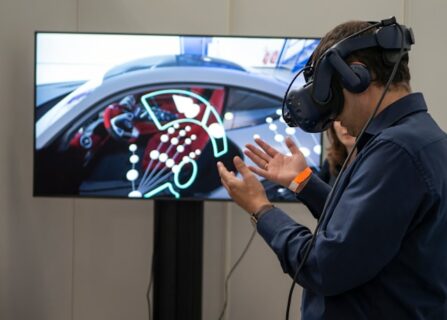
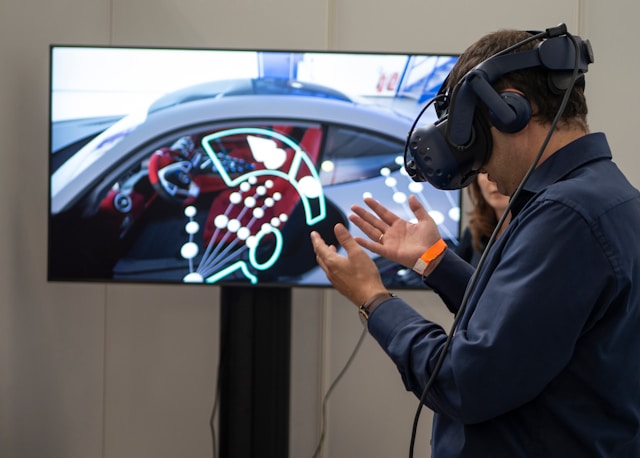
Immersive technologies blend the physical world with digital reality to create unique experiences. Among these technologies, Augmented Reality (AR) and Virtual Reality (VR) stand out as primary forms that share many common characteristics. AR integrates computer-generated information into the user’s real-world surroundings, while VR employs computer-generated content to construct a fully immersive virtual environment.
In contemporary society and workplaces, these immersive technologies have evolved into everyday tools. Notably, the gaming industry has witnessed substantial investments in immersive technologies, with numerous companies developing VR games. In healthcare, surgeons use AR headsets to visualize surgical procedures and access patient health information during operations. Education employs AR and VR for visualizing interactive content in lectures. Furthermore, companies adopt VR for employee training, fostering creativity in product design, and facilitating collaboration among team members situated in different locations. In marketing, VR allows consumers to virtually interact with products, eliminating the need for physical presence.
This lecture delves into the profound impact of immersive technologies on shaping the future of both society and the workplace. It explores the current and future opportunities and challenges associated with these technologies, teaches fundamental concepts and design principles, explains their applications, and provides insights into the current state of research. Additionally, the lecture equips participants with essential knowledge to create their own immersive information systems.
Project

The course is complemented with a practical project where students, working in teams, choose and apply design methods as well as techniques to develop a prototype for an immersive information system. To facilitate this, students will learn fundamental skills in developing immersive applications using Unity. Within this project, students can effectively apply the knowledge and skills acquired during the lectures and throughout their studies in a challenging context.
Learning Objectives and Skills
Students will acquire an understanding of the foundational design principles of immersive information systems and can analyze and discuss such systems. Students will also learn state-of-the-art methods, techniques, and tools for successfully conducting VR projects, with the ability to choose and apply them appropriately. The course fosters the development of creativity as well as prototyping skills and enhances collaboration and presentation abilities.
Prerequisites
It is crucial that participants are highly motivated for collaboration in a group project. Furthermore, having fundamental programming skills would be beneficial to facilitate the practical implementation of a prototype in Unity as part of the project. However, the module does provide a step-by-step tutorial for Unity.
Lecturers
Guest lecturers in summer semester 2024:
Theo Papadopoulos – Head of Siemens Industrial Metaverse Lab
Course details
Lecture + Open Lab Sessions, 4 SWS
ECTS
Credits: 5
Form of examination
60-Minute written exam (60%) and project presentation (40%)
Registration
11.03.2024 – 07.04.2024 via StudOn
Dates and Room
Tuesday, 15:00 – 16:30, LG 4.156
Module compatibility
Bachelor Information Systems: Module in the section Information Systems – Architectures & Development (Elective)
Bachelor Information Systems: Module in the section Information Systems – Extension Courses (Elective)
Additional information
More details on course updates, materials, technical requirements, and other information will be announced in StudOn.
Keywords: Immersive Information Systems, Virtual Reality, Human Computer Interaction, User Experience, User Interface, Unity
Research Seminar: Interactive and Gameful Information Systems (BA & MA)


The research seminar Interactive and Gameful Information Systems provides theoretical, methodical, and practical insights into research in the fields of Information Systems and Human-Computer Interaction (HCI). The seminar offers students the opportunity to work independently or in small groups on current research topics of the Gamification Research Group. Projects focus on topics such as gamification, augmented reality, virtual reality, metaverse, user experience design, human-robot interaction, content creation, social media, and serious games.
The seminar aims at teaching students to conduct qualitative and quantitative studies using statistical software, such as SPSS or SmartPLS. Students learn to independently plan and execute research as a preparation for a master thesis. In addition, students gain an understanding of the advantages and limitations of empirical research, as well as how to effectively communicate and critically evaluate scientific findings. This knowledge can prove valuable not only for pursuing an academic career, such as a doctoral program, but also for any role in public or private sectors that involves decision-making.
Topics
In the summer semester of 2024, we will be offering topics related to:
– Fontan Quest: Development and empirical evaluation of a gamified application for Fontan kids and their parents.
– Archetypes of gameful radicalisation and extremism in the metaverse: A systematic analysis of user-generated games
Research topics will be announced on this website and in StudOn. If no (suitable) topics are announced, please contact Prof. Dr. Benedikt Morschheuser via email.
Prerequisites
Profound English skills are required.
Method of examination
Seminar paper and presentation
Lecturers
Prof. Dr. Benedikt Morschheuser
Course details
Block lectures + Seminar Thesis
ECTS-Credits: 5
Dates
Announced in StudOn and Campo
Registration
Via StudOn.
Seats are limited.
Additional information
More details on the seminar, materials, technical requirements, and other information will be announced in StudOn.
Project Seminar: Understanding and Designing the Metaverse (MA)


Since the science-fiction author Neal Stephenson coined the term “metaverse” in his novel Snow Crash, a portmanteau of “meta” (Greek for beyond) and “universe”, people have been dreaming of realizing his vision of a virtual reality-based three-dimensional (3D) successor to the Internet, in which people interact with each other, virtual agents and objects in the form of avatars. This virtual universe is envisioned to exist in parallel to reality, has its own economy, culture, organizations, rules, and laws, and, similar to the Internet, is considered to be an open, distributed, and collectively created space where anyone can become a content creator and can shape this collectively created virtual world.
Driven by recent cultural and societal developments − such as the increasing popularity of digital games and the acceptance of remote collaboration − as well as technological advances − such as AR and VR, 5G, blockchain technologies, cloud computing, streaming technologies, or artificial intelligence − various big technology companies have started developing platforms from which a potential metaverse could emerge soon. Metaverse-like platforms such as Roblox, Fortnite Creative, The Sandbox, VR Chat, Meta Horizon Worlds, and Minecraft are already attracting millions of users to design and jointly experience virtual worlds.
This seminar aims to understand how the metaverse may shape the future of research, education, business, healthcare, and society as well as what current and future challenges the topic entails. In this seminar, students explore the ongoing scientific discourse on the topic and strive to understand what socio-technological trends may support the further development of the metaverse. To this end, the students create immersive 3D content on popular and emerging metaverse-like platforms and investigate relevant research questions related to the topic in empirical studies. The seminar is positioned at the intersection of Information Systems and Human-Computer Interaction and strives to create knowledge by implementing and evaluating prototypes, interactive experiments, and case studies.
This project seminar applies a research-based learning approach, in which students learn how to read and understand scientific papers, develop, and evaluate hypotheses by using scientific methods, and think critically and creatively. Students learn how to solve scientific problems, challenges, and dilemmas. Further, the course trains skills for communicating in the field of science through writing and discussion and thus prepares writing a master thesis.
Prerequisites
Profound English skills are required. Further, creativity, experience in software design, user experience, prototyping, and software engineering are very helpful.
All participating students should be motivated to work in an international and interdisciplinary group on a challenging topic.
In-depth game design knowledge, e.g. from participation in the course Designing Gamified Systems, is helpful and recommended.
Most of our projects require knowledge of software development. Willingnes to code is a prerequisite to participate in this course.
Topics
In the winter semester of 2024, we will be offering topics related to:
– INFLAMMANIA 3D – The Inflammation World: Several topics related to how we could use Roblox games as a media in medical education and science communication (see: https://gamification.rw.fau.eu/courses/student-projects/inflammania-3d/)
– PRIME – Privacy in the Metaverse (see: https://gamification.rw.fau.eu/research-gamification-and-digital-customer-engagement/research-projects/)
– Industrial Metaverse – Understanding the potential of the metaverse to increase situational awareness in dynamic decisions
– Metaverse meets Healthcare – Designing and understanding solutions for including the virtual self in transformative healthcare
Method of examination
Seminar paper and presentation
Lecturers
Prof. Dr. Benedikt Morschheuser
Tutors
Runjie Xie & Jonathan Stief (Roblox development)
Course details
Block lectures + Group work + Seminar Project
ECTS-Credits: 5 as team project, 10 as individual project (by arrangement)
Dates
Announced in StudOn and Campo
Registration
Via the official IIS seminar registration process.
Link to StudOn: https://www.studon.fau.de/crs5986405_join.html
Seats are limited.
Additional information
More details on the seminar, materials, technical requirements, and other information will be announced in StudOn.
Keywords: Metaverse, Interactive Information Systems, HCI, Web3, Virtual Reality, Augmented Reality, Mixed Reality, Gamification, Games
Designing Gamified Systems @EELISA (MA)
Register now via StudOn until 08. October 2021!

Driven by the rising popularity of digital games, technology, business and society are increasingly influenced and penetrated by games and trends of the gaming industry. One of the probably most important phenomena of this multi-faceted development is “gamification”, which refers to the use of design principles and features from games in the design of information systems, processes, and services.
Gamification’s popularity stems from the notion that games are a pinnacle form of hedonic information systems and thus are particularly effective in invoking intrinsic motivation and experiences such as autonomy, mastery, flow, immersion, relatedness and overall enjoyment. Across industries, marketers, designers and developers are thus using gamification as a design approach when engineering digital products and services with the purpose of inducing gameful experiences, influencing human motivation and even change behavior in various contexts.
This course
- teaches the key concepts, design patterns, and approaches of motivational, hedonic (i.e. games and video games), social and gamified information systems.
- offers deep insights into advanced concepts and theoretical foundations of game design, motivational psychology, and information system design.
- introduces methods and frameworks for designing gamified systems and managing gamification projects.
- discusses latest research findings and the potential impact of gamification on society, economy and everyday life.
Course Overview
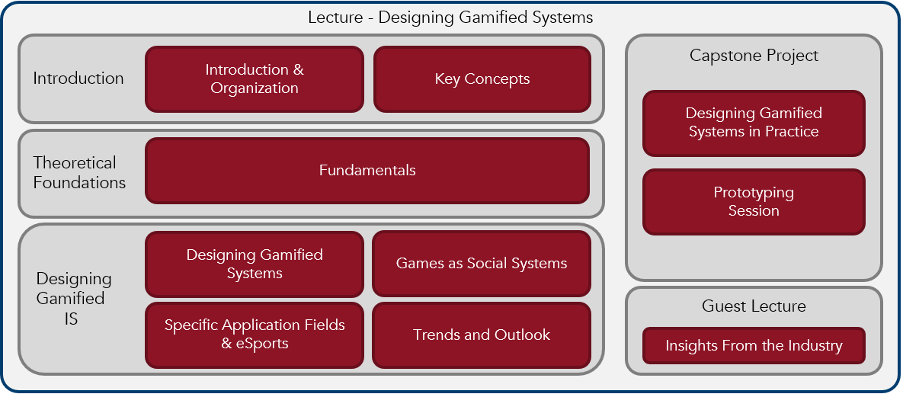
Capstone Project
The course is complemented with a practical design project, where students in a team select and apply design methods & techniques in order to create a prototype of a gamified / hedonic information system. Within this project, the students can apply knowledge and skills acquired in this lecture and their studies in a challenging context.
EELISA
In the winter semester, this course is offered as part of the European Engineering Learning Innovation and Science Alliance (EELISA – https://eelisa.eu). Thus, we have reserved seats for EELISA students. The EELISA cooperation will give the lecture an even more international setting and allow FAU students to collaborate in their projects with interdisciplinary students from all over Europe. Further, the course will have an adapted scope, focussing on engineering and the gamification of fields, such as mobility, production, cities, logistics, and technologies.
Learning Objectives and Skills
The students gain knowledge in understanding the underlying design principles of gamified and hedonic information systems and can analyze and discuss such systems. The students learn state-of-the-art methods, techniques, and tools for successfully conducting gamification projects and can select and apply them. The students can train their creativity, their prototyping skills as well as improve their collaboration and presentation skills.
Tutorials
The sessions are accompanied by tutorials, where students can learn the basics of developing games in Unity3D, as well as discuss current challenges in the implementation of their projects.
Prerequisites
Profound English skills are required. Further, creativity, experience in software design, user experience, prototyping, and software engineering are helpful. All participating students should be motivated to work in an international and interdisciplinary group on a challenging topic.
Lecturers
Prof. Dr. Benedikt Morschheuser
Guest lecturers:
Alexander Satanowsky – Head of in-Car Gaming – Mercedes-Benz AG
Georgina Guillén-Hanson – Researcher on Gamifying Sustainable Consumption – Gamification Group
Dr. Michael Reinhardt & Nicolas Butterwegge – OpenIT Studio – Siemens Healthineers
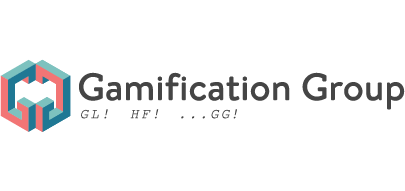 |
Tutor
Course details
Lecture + Capstone Project, 4 SWS, ECTS-Credits: 5
Dates
Thursday, 13:15-16:30 , Zoom-Meeting
Module compatibility
Master International Information Systems (from 2018/19): Module in the section Information Systems – Architectures & Development (Elective)
Master International Information Systems (from 2016/17): Module in the section Information Systems – Extension Courses (Elective)
Master Wirtschaftsingenieurwesen (Elective)
Master Elektrotechnik-Elektronik-Informationstechnik (Elective)
Master Information and Communication Technology (Elective)
EELISA students please contact: eelisa@fau.de
ECTS
Credits: 5
Registration
30. August 2021, 14:00 – 08. October 2021, 12:00 via StudOn.
Additional information
More details on course updates, materials, technical requirements, and other information will be announced in StudOn.
Keywords: Gamification, Interactive Information Systems, HCI, Customer Engagement, Social Computing, Hedonic Systems, Games
Exergames (MA)

This course follows a challenged-based learning approaches and deals with the theory, design, and development of games for health, prevention, therapy and rehabilitation. In few sessions the course provides theoretical game-design and gamification foundations. Then the students start to work in small groups to realize working exergames.
The theoretical introduction include:
– Gamification and Game-Design foundations
– Social and motivation psychology
– Introduction on games for health, Exergames and Cyber Rehabilitation
Exemplary project themes could be:
– Location-based exergames that combine AR technologies with, sports and POIs in real world
– Designing gameful approaches for patients with Mild Cognitive Impairment, dementia, or depression
– Designing gamified nature-based therapy approaches
– VR supported rehabilitation procedures for patients with motor impairments
The course is designed in an interactive format. Based on initial discussions, students research, design, develop, and evaluate innovative gameful solutions in small groups following user-centered design and agile software engineering principles. Intermediate presentations of the project group members take place at regular intervals.
After participating in the module, students
- can explain the application of Serious Games and Exergames in the context of health.
- are able to understand the technical and theoretical foundations of interdisciplinary interfaces between games and health.
- are able to apply this basic knowledge to conceptualize methodical solutions and empirical studies with various tools.
- are able to interpret empirical findings from the literature in this field.
- they are able to apply game technologies for use cases in health, create applications, and collect empirical data based on learned methods.
- can implement software development projects in practice-oriented contexts.
- can apply fundamental project management principles, organize themselves in groups, work toward specific goals and consider relevant stakeholder needs.
Lecturers
Prof. Dr. Daniel Roth (Human-Centered Computing and Extended Reality)
Prof. Dr. Benedikt Morschheuser (Assistant Professorship of Information Systems – Gamification)
Course details
Lecture + Open Lab Sessions, 4 SWS, ECTS-Credits: 5
Dates
Thursday, 10:15-11:45 , EL 4.14, Building 11501.04.222, Cauerstraße 9, Turm A, 91058 Erlangen.
Module compatibility
Master International Information Systems (from 2018/19): Module in the section Information Systems – Architectures & Development (Elective)
Master International Information Systems (from 2016/17): Module in the section Information Systems – Extension Courses (Elective)
Master Medical Engineering (Medizintechnik)
Master Computer Science (Informatik)
ECTS
Credits: 5
Registration
–
Additional information
More details on course updates, materials, technical requirements, and other information will be announced in StudOn.
Designing Gamified Systems (MA)


Driven by the rising popularity of digital games, technology, business, and society are increasingly influenced and penetrated by games and trends of the gaming industry. One of the probably most important phenomena of this multi-faceted development is “gamification”, which refers to the use of design principles and features from games in the design of information systems, processes, and services.
Gamification’s popularity stems from the notion that games are a pinnacle form of hedonic information systems and thus are particularly effective in invoking intrinsic motivation and experiences such as autonomy, mastery, flow, immersion, relatedness, and overall enjoyment. Across industries, marketers, designers, and developers are thus using gamification as a design approach when engineering digital products and services with the purpose of inducing gameful experiences, influencing human motivation, and even change behavior in various contexts.
This course:
- teaches the key concepts, design patterns, and approaches of motivational, hedonic (i.e., games and video games), social and gamified information systems.
- offers deep insights into advanced concepts and theoretical foundations of game design, motivational psychology, and information system design.
- introduces methods and frameworks for designing gamified systems and managing gamification projects.
- discusses latest research findings and the potential impact of gamification on society, economy, and everyday life.
Course Overview
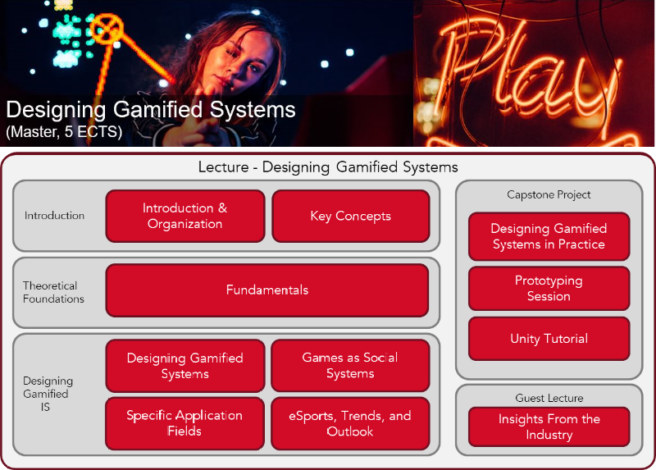
Capstone Project
The course is complemented with a practical design project in which students in a team select and apply design methods as well as techniques in order to create a prototype of a gamified or hedonic information system. Within this project, the students can apply knowledge and skills acquired in this lecture and their studies in a challenging context.
EELISA
This course is offered as part of the European Engineering Learning Innovation and Science Alliance (EELISA – https://eelisa.eu) to give the lecture an even more international setting and allow FAU students to collaborate in their projects with interdisciplinary students from all over Europe.
Learning Objectives and Skills
The students gain knowledge in understanding the underlying design principles of gamified and hedonic information systems and can analyze and discuss such systems. The students learn state-of-the-art methods, techniques, and tools for successfully conducting gamification projects and can select and apply them. The students can train their creativity, their prototyping skills as well as improve their collaboration and presentation skills.
Tutorials
The sessions are accompanied by tutorials where students learn the basics of developing games in Unity3D, as well as discuss current challenges in the implementation of their projects.
Prerequisites
Profound English skills are required. Further, creativity, experience in software design, user experience, prototyping, and software engineering are helpful. All participating students should be motivated to work in an international and interdisciplinary group on a challenging topic.
Lecturers
Prof. Dr. Benedikt Morschheuser
Tutors
Sandra Birnstiel (Unity3D and programming support)
Dr. Jeanine Kirchner-Krath (Advice on psychological theories and study design)
Partners and guest lecturers in summer semester 2024:
Project partners:
Dr. Jens Barth − Head of Software Solutions at STABILO International GmbH
Dr. Christine Anstätt − Senior Manager Innovation Projects at adidas AG
Pascal K. Whiba − Entrepreneur Digital Health (Exergaming.org)
Ralf Nickel − Schön Klinik, München
Dr. Kathrin Fuhrmann − Head of the Green Office at FAU
Guest lecturers:
Georgina Guillén-Hanson − Researcher on Gamifying Sustainable Consumption (Gamification Group Finland)
Daniel Fernández Galeote − Game Designer and Researcher on Gamifying Sustainable Consumption (Gamification Group Finland)
Dr. Velvet Spors − Researcher on Gamification of Mental Health (Gamification Group Finland)
 |
 |
 |
 |
Course details
Lecture + Capstone Project, 4 SWS, ECTS-Credits: 5
Dates
Thursday, 09:45-13:00, LG 0.424
Module compatibility
WF IIS-MA 1 (ECTS-Credits: 5)
WF IIS-MA 2 (ECTS-Credits: 5)
WF IIS-MA 3 (ECTS-Credits: 5)
WF IIS-MA 4 (ECTS-Credits: 5)
WF WING-MA from 1 (ECTS-Credits: 5)
WF ICT-MA from 1 (ECTS-Credits: 5)
WF EEI-MA from 1 (ECTS-Credits: 5)
ECTS
Credits: 5
Registration
Starts on 2024 February 25, 14:00 via StudOn.
Additional information
More details on course updates, materials, technical requirements, and other information will be announced in StudOn.
Keywords: Gamification, Interactive Information Systems, HCI, Customer Engagement, Social Computing, Hedonic Systems, Games
Inspiration of previous semesters
Summer semester 2023
Capstone project topics:
- Design a strategy game in which the players take over the role of the immune system, make strategic decisions in order to win and learn more about the role of the protein IL-33 and how the immune system is using inflammations to eliminate attackers (for instance, bacteria) and set repair mechanisms in motion.
- Design a cooperative gameful simulation in Roblox in which the players take over the role of the immune system of a patient with Systemic Lupus Erythematosus (SLE) in the novel and revolutionary CAR T-cell therapy developed as part of this FAU research project
- Design a gamification approach that engages patients with lung diseases (e.g. Asthma or chronic obstructive pulmonary disease COPD) to participate in an app-based breath training for 20 days by using gamification elements to invoke competence satisfaction and an unique “game feel”.
- Design a gamification approach that engages patients with lung diseases (e.g. Asthma or chronic obstructive pulmonary disease COPD) to participate in an app-based breath training for at least 20 days by using a theme or narratives as a core games mechanic.
Focus:
Gamification, Heath, Science Communication, Games
Partners and guest lecturers:
Baturay Yalvac − COO (Breathment)
Sandra Jeleazcov − CEO SFB1181 (University Hospital Erlangen)
Georgina Guillén-Hanson − Researcher on Gamifying Sustainable Consumption (Gamification Group Finland)
Daniel Fernández Galeote − Game Designer and Researcher on Gamifying Sustainable Consumption (Gamification Group Finland)
Dr. Velvet Spors − Researcher on Gamification of Mental Health (Gamification Group Finland)
 |
 |
 |
Summer semester 2022
Capstone project topic:
Design and investigate a novel digital gamification solution for your favorite team sports in order to increase the athlete’s training experience and the social dynamics within teams.
Focus:
Gamification, Team sports, Collaboration, Training, Augmented Reality, Health
Partners and guest lecturers:
Burkhard Dümler − Director Program & Projects IT Innovation (adidas AG)
Georgina Guillén-Hanson − Researcher on Gamifying Sustainable Consumption (Gamification Group Finland)
Daniel Fernández Galeote − Game Designer and Researcher on Gamifying Sustainable Consumption (Gamification Group Finland)
 |
Winter semester 2021/2022
Capstone project topic:
Design of an innovative game or gamification approach at the intersection of gaming, mobility and space technology, which improve life on earth or travel in space.
Focus:
Gamification, Crowdsourcing, Satellite Techonology, Mobility, Augmented Reality
Event:
Billionaires start space tourism
Guest lecturers:
Alexander Satanowsky − Head of in-Car Gaming (Mercedes-Benz AG)
Georgina Guillén-Hanson − Researcher on Gamifying Sustainable Consumption (Gamification Group Finland)
Daniel Fernández Galeote − Game Designer and Researcher on Gamifying Sustainable Consumption (Gamification Group Finland)
Dr. Michael Reinhardt − Head of OpenIT Studio (Siemens Healthineers)
Nicolas Butterwegge − IT Strategy Manager (Siemens Healthineers)
 |
Summer semester 2021
Capstone project challenge:
Design of an innovative game or gamification approach in which sports, gaming, and mobility meet as part of an unforgettable mixed-reality experience for potential visitors of the 2022 Olympic Asian Games in China, Hangzhou.
Focus:
eSports, Sports, Augmented Reality, Mobility, Gamification
Event:
Asian games announced to have eSports as official discipline
Guest lecturers:
Alexander Satanowsky − Head of In-Car Gaming (Mercedes-Benz AG)
Georgina Guillén-Hanson − Researcher on Gamifying Sustainable Consumption (Gamification Group Finland)
Daniel Fernández Galeote − Game Designer and Researcher on Gamifying Sustainable Consumption (Gamification Group Finland)
 |